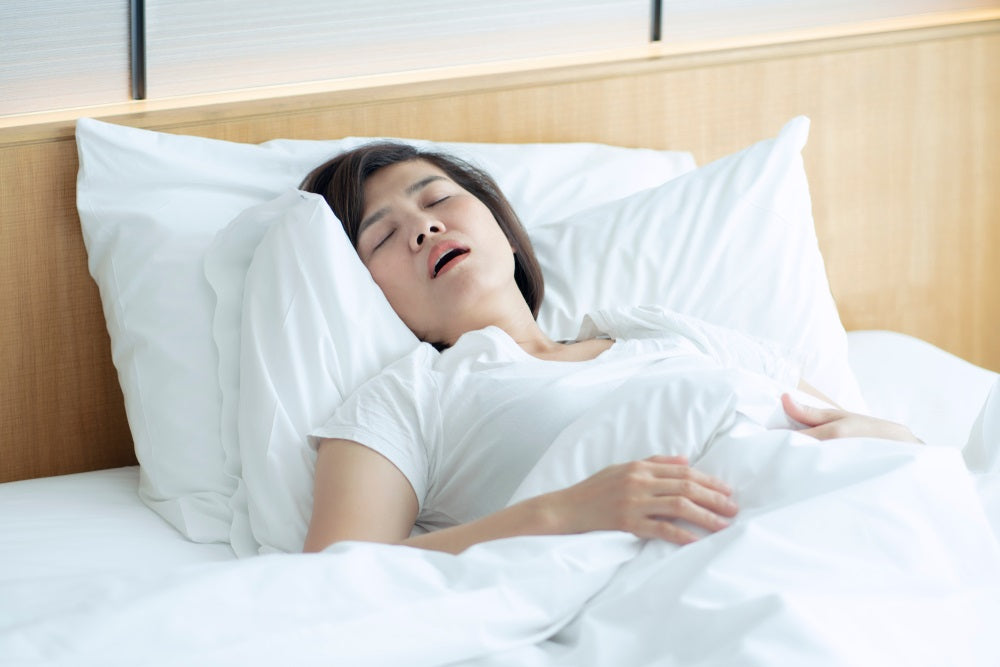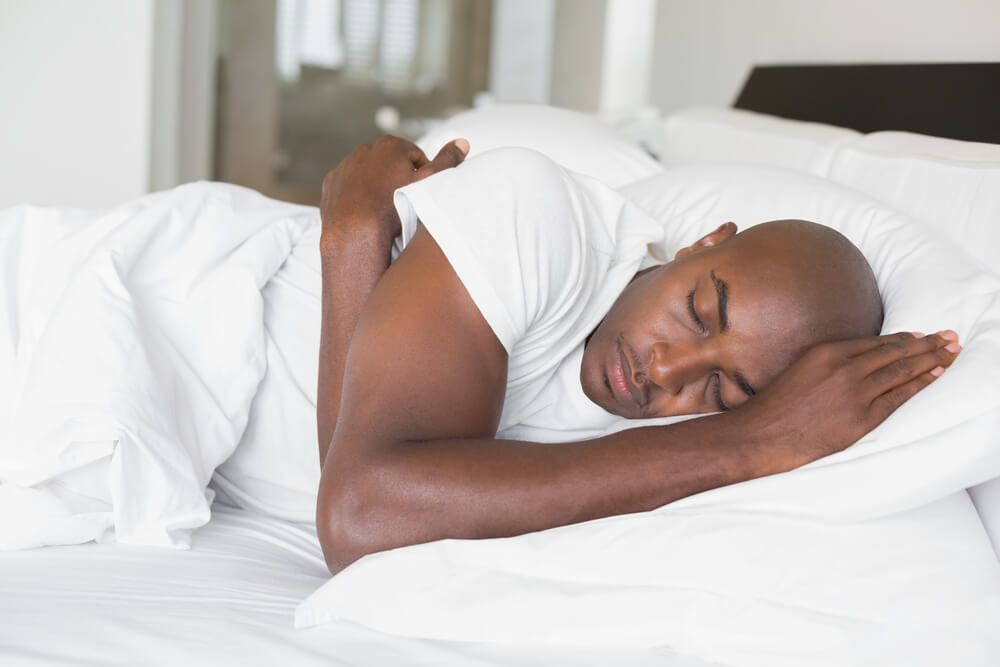The best way to stop sleeping with your mouth open is to first identify the cause of your mouth breathing at night, such as allergies, sinus infections, or structural issues, and then address it with appropriate treatment.
To protect against mouth breathing, experts recommend sleeping upright or on your side.1 If your doctor recommends it, other solutions include supportive pillows, mouth tape, and nasal strips.
Nighttime mouth breathing is a complex topic. So get comfy, relax, and take a deep breath through your nose as we dive into the causes, symptoms, and actionable tips for how to stop sleeping with your mouth open.
The Risks of Mouth Breathing During Sleep

Let’s examine the health conditions linked to chronic mouth breathing. You may be surprised to learn that it’s an extremely common condition.
The Commonality of the Issue
Before you run to your doctor because you accidentally napped with your mouth open, it’s important to understand the difference between occasional mouth breathing and chronic mouth breathing.
Occasional mouth breathing can occur in response to an illness like a cold and is not a cause for concern — but chronic mouth breathing can mean that the individual has an underlying medical issue or needs re-training on how to breathe easier through the nose.2 Occasional mouth breathing is often a temporary response to a sickness or allergen and is fairly common — but if you have concerns about your mouth breathing, consult your healthcare provider.
Health Complications from Chronic Mouth Breathing
Some of the health complications from chronic mouth breathing include:
-
Dental issues – Mouth breathing makes the mouth extremely dry, and without saliva to wash bacteria from the mouth, dental issues like cavities, gum disease, and enamel loss can take root.3
- Yeast infections inside the mouth – A type of yeast called Candida regularly hangs out in the mucus membranes of your nose and mouth.4 When the mouth severely dries out from mouth breathing overnight, this can cause an overgrowth of bacteria and infection inside the mouth. Sometimes associated with the use of antibiotics, this condition is commonly referred to as Thrush — and you’ll know it when you see white blotches on your mouth, tongue, and back of your throat.4
- Severe dry mouth – When the mouth is severely dry due to mouth breathing, possible complications include bad breath, difficulty chewing and swallowing, or cracked lips.5
- Facial changes in children – In children, chronic mouth breathing can cause the face to develop abnormally. Children left untreated can develop longer, narrow faces, narrow mouths, gummy smiles, or dental malocclusions such as an overbite or crowded teeth.
Symptoms of Sleeping with Mouth Open at Night

Whether you know you sleep with your mouth open or not, you may notice some signs in your waking life that your mouth was still open in the twilight hours.
Dry Mouth Upon Waking
Because mouth breathing can dry out the mouth and deplete the healthy protective saliva inside, you may wake up with severe dry mouth, resulting in some discomfort.
Reduced Saliva
Saliva can help prevent tooth decay by neutralizing acids produced in bacteria, washing away the nasty stuff like plaque and food particles that can harm your teeth if left unchecked.5 Saliva is also crucial in enhancing our ability to taste as well as making it easier to chew and swallow.5 Breathing through the mouth at night can reduce the levels of crucial saliva as you sleep.
Bad Breath and Cracked Lips
While minor “morning breath” is extremely common and usually nothing to be concerned about, severe dry mouth can result in strong, unpleasant mouth odor. Additionally, the dryness of the mouth can cause your lips to dry out and crack overnight.
Sore Throats and Runny Noses
You might wake up with a dry or hoarse throat and a runny nose due to the evaporation of the mouth’s natural moisture during nighttime mouth breathing and interaction with allergens and environmental irritants.
Reduced Effectiveness of PAP Treatment
Mouth breathing can be an obstacle to the effectiveness of your PAP (positive airway pressure) therapy if you require a device for sleep apnea or related disorders. The purpose of a machine such as a CPAP (continuous positive airway pressure) apparatus is to open the nasal airways — however, the default for many obstructive sleep apnea patients is to breathe through the mouth because of obstructions within the nose that prevents nose breathing.6
Mouth breathing while on a PAP treatment can lead to symptoms of dry mouth and blockages of the airway due to the shifting of the tongue overnight, negating the benefits of the CPAP machine’s assistance in opening the nasal passage.6
Uncovering the Causes of Mouth Breathing at Night
Mouth-breathing can be caused by a variety of temporary or habitual factors — sometimes, mouth-breathing can even point to larger underlying health issues and sleep problems.
Temporary and Habitual Causes
Some examples of temporary or habitual issues that can cause mouth breathing include:
-
Nasal congestion – A passing cold or flu can congest the nasal airways, temporarily making breathing through the mouth easier for many individuals (especially children).
- Blockage due to foreign objects – Another more common occurrence in children is a nasal blockage due to a foreign object lodged in the nostril. Consult your healthcare provider immediately if you suspect something is stuck in your child’s nose, and look out for mouth-breathing as a potential symptom.
Underlying Health Conditions
Additionally, examples of underlying health issues that can be linked to mouth breathing include:
-
OSA – Obstructive sleep apnea (OSA) is the most common sleep-related breathing disorder, causing patients to repeatedly stop and start breathing while they sleep.7 Chronic mouth breathing can cause patients with sleep apnea to sleep with their jaw and tongue in a position that cuts off breathing, leading to disrupted sleep.2 OSA keeping you up at night? Keep these sleeping positions for sleep apnea and the best mattresses for sleep apnea in mind.
- Swollen adenoids – Adenoids are a patch of tissue that sits at the back of the nasal passage, and they can enlarge when fighting infections or allergies.8 Adenoids are most active in children since the body develops more effective means of fighting infection with age — however, if enlarged adenoids are left unattended, mouth-breathing can occur in children.
-
Deviated septum – A deviated septum refers to the extreme displacement of the septum — the wall made of cartilage and connective tissue that separates your nasal passages.2 When the nasal passages are unbalanced, this can create breathing problems due to reduced airflow through the nose — often resulting in mouth breathing to compensate.
- Misaligned teeth – When the teeth do not fit together properly due to an affected bite or misaligned jaw, regular airflow may become restricted.2 This may lead to mouth breathing as an additional means to intake air to offset the impacted airway.
Effective Solutions to Combat Mouth Breathing
The sleep experts at Casper are always updating our techniques and assembling top-tier recommendations to help every person achieve the quality night’s sleep they deserve. For those impacted by mouth-breathing at night, here are some of the best practical tips to put the issue to rest.
Addressing the Root Cause
As a priority, address any underlying condition that could impact airflow in the nasal passages, particularly allergies, asthma, or sinus infections. Treating these conditions can improve airflow through the nose, allowing patients’ airways to work at their best through comfortable nasal breathing.
Popular Techniques and Their Efficacy
Some individuals with difficulty breathing through their nose at night use nasal strips to help improve nasal airflow. These strips may help increase the caliber or diameter of the nasal passage, opening them up to allow you to breathe easier and reduce loud snoring.6
Mouth taping may help to increase breathing through the nose. However, consult your doctor to determine if mouth taping is right for you, as it does not necessarily cure the underlying cause of mouth-breathing and can cause skin irritation and limit your ability to breathe. If you choose to try mouth-taping, use only a narrow piece of gentle hypoallergenic elastic tape applied vertically to allow some movement and the passage of air if necessary.1
Adjusting Sleep Position
Some experts recommend sleeping on your side to reduce mouth breathing and improve your quality of sleep.1 This position helps the airways stay clear so you can breathe smoothly and steadily throughout the night, especially if you have OSA. For help adjusting to a side sleeping position, consider a Casper pillow engineered specifically for comfort and support as well as investing in the best mattress for side sleepers.
Surgical Interventions
While surgery might seem like an extreme option, the procedures below are fairly common and routine treatments to help children and adults suffering from prolonged mouth breathing.
- Adenoidectomy – The surgical removal of the swollen adenoids is one of the most common surgical procedures done on children.8
- Nasal polyps treatment – If nasal polyps prevent nose breathing, a doctor can prescribe a nasal corticosteroid spray to shrink them. If that doesn’t work, an endoscopic surgery can usually remove them. This is most often completed as an outpatient procedure.9
When to Seek Medical Advice
If you suspect your mouth breathing is serious and may have underlying causes, consult your medical provider immediately to help steer you toward the right treatments and courses of action.
How Casper Products Can Enhance Your Sleep
Your sleep is a foundational pillar supporting your overall health. Let Casper be your ally in helping you achieve the best rest of your life.
For maximum comfort and the support your body craves, upgrade to a Casper mattress for the best in sleep technology and innovation. If it’s been a while since you’ve refreshed your bedding, browse the selection of Casper sheets for a breathable, irresistibly cozy bedroom improvement. And don’t forget a Casper pillow to help you achieve the best sleeping position to alleviate nighttime mouth-breathing difficulties.
Sources:
- University Hospitals. Is Mouth Taping a Safe Choice for Better Sleep? https://www.uhhospitals.org/blog/articles/2023/01/is-mouth-taping-a-safe-choice-for-better-sleep
- Medical News Today. What’s wrong with breathing through the mouth? https://www.medicalnewstoday.com/articles/319487
- Healthline. What to Know About Mouth Breathing. https://www.healthline.com/health/mouth-breathing#complications
- Cedars-Sinai. Candida Infection: Thrush. https://www.cedars-sinai.org/health-library/diseases-and-conditions/c/candida-infection-thrush.html
- Mayo Clinic. Dry mouth. https://www.mayoclinic.org/diseases-conditions/dry-mouth/symptoms-causes/syc-20356048
- Verywell Health. Using CPAP When You Mouth Breathe. https://www.verywellhealth.com/can-i-use-cpap-if-i-mouth-breathe-3015278
- Mayo Clinic. Obstructive sleep apnea. https://www.mayoclinic.org/diseases-conditions/obstructive-sleep-apnea/symptoms-causes/syc-20352090
- Mayo Clinic Health System. Enlarged Adenoids. https://www.mayoclinichealthsystem.org/locations/mankato/services-and-treatments/otorhinolaryngology/pediatric-ent-conditions/enlarged-adenoids
- Johns Hopkins Medicine. Nasal Polyps. https://www.hopkinsmedicine.org/health/conditions-and-diseases/nasal-polyps
Casper Editorial Policy
Casper blog articles are written by skilled authors and periodically reviewed by our team of sleep experts at Casper Labs. Driven by comprehensive research and evidence-based practices, we ensure that the content we publish is reliable, actionable, and practical for enhancing sleep quality and wellness.
Our articles incorporate trusted third-party sources, cited within the content and listed at the end for easy reference. At Casper we strive to be an authority and trusted resource for all things sleep.













